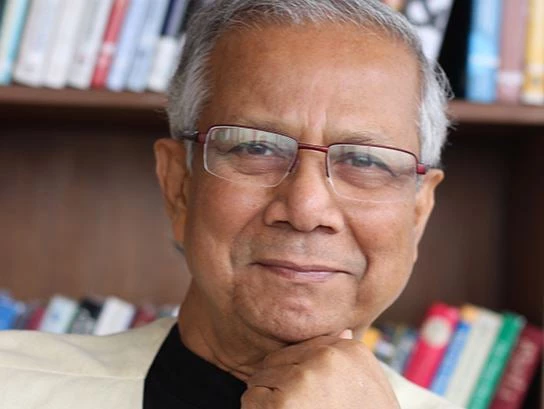“What are you waiting for? Get out there and create your future”. This conveys the spirit of Mohammed Yunus’ lecture last week at the World Bank. His messages on social business and entrepreneurship raised a number of questions as to how we think about education, skills, employment and the future prospects of youth in the world.
In fact, it was one of those weeks, when the cosmic tumblers of synchronicity happened to open this theme of an entrepreneurial mindset everywhere I looked.
But first, about Prof. Yunus -- who is the founder of Grameen Bank and the father of micro-finance – loaning 97% of Grameen resources to women and lending US$1.5 billion last year. The main themes of the lecture can be summarized below:
We are all entrepreneurs.
By our nature, humans are curious problem solvers. The true nature of an entrepreneur is to solve problems. Not to make money but to solve problems. The problem and the quest for the solution drive the human spirit. As entrepreneurs we see problems, think about solutions, take action, learn, fail, and try again.
Every problem is a business opportunity.
Mohammed Yunus creates companies to solve problems. From his perspective, companies are the best way to perpetuate the use of scare resources. A charity gives money once and it is finished, gone. In a business, the money must be repaid, can be used again and grow. The money comes back.
Social Businesses as problem solving engines.
He calls his businesses social businesses. Personal profit is not what gets us up in the morning and the economic theory of self-interest limits the potential of business to do good. Social businesses may not make a profit but they are sustainable. Too many view business as vehicles for the selfish pursuit of money and not for the selfless pursuit of solutions. He creates the latter including Danone solving malnutrition, Sustainable Forestry in Haiti, and Nursing Education, etc. In all of the above cases, those who receive money are expected to act and repay that initial principle – sustaining the next investment, hence, perpetuating growth.
Growth is what all humans need.
Youth should be trained to change the world, not find a job. Being trained to find a job is an obsolete idea. We need more job creators than job seekers. Humans are not born to work for someone else but have natural capacity to solve their own problems. We have unlimited potential for creativity. Young people should be inspired to use that creativity to solve problems and change the world (and not limited to learning quadratic equations).
Get moving.
Why are young people sitting around? Unemployed. That is by choice. What are they waiting for? With 40% youth unemployment in Spain, why are youth not being productive? Why does someone need to give them a job to convey value? Prof. Yunus’ vision of the future is one with no unemployment. In Yunus’ future, young people will look back and ask why were youth unemployed? “Were they sick?” they will ask. Why didn’t they create their own future?
Invest in social business funds.
What can the World Bank do to support young entrepreneurs? Create social business funds with our clients. Provide capital to help young people start to address global challenges. Invest in ideas and creativity.
As with any provocative lecture, more questions than answers emerge. How should curriculum change to support entrepreneurship? What are the nudges that young people need to find their passion? Can you train entrepreneurs? Should you even try? What would be the perfect multiple choice question to measure entrepreneurship?
Yunus’ vision presumes that the youth of today have the skills and motivation to go forth into the world and conquer. Which brings us back to the fundamental questions of what are these skills and how can they be cultivated? What are the nudges and social capital that will motivate youth?
As the week passed more themes of entrepreneurship and education emerged (with more questions). I have listed some of them here:
White House and Department of Education exploring plan to support alternative training –– with 16,000 students expected to graduate from bootcamps this year, the government wants to figure out how to support non-traditional institutions in providing competency based education and personalized learning models. Is there a non-traditional model for supporting young people to be entrepreneurs and create social businesses?
Global Entrepreneurship Summit in Kenya. President Obama spoke at this summit on July 25, 2015, recognizing the innovations coming out of Kenya – Ushahidi, M-PESA, and Icow – encouraging young people to “go out there and start something”. What is the role of an organization like I-Hub in providing information training and social capital for youth?
World Bank study on entrepreneurship education and training. This same week, my colleagues here at the World Bank shared this report on findings from 230 entrepreneurial education and training programs from around the world that show positive impacts on developing entrepreneurial mindsets – changes to socio-emotional skills, entrepreneurial capabilities, entrepreneurial status and performance. They also published this nice infographic. Can you teach entrepreneurship or support young people to be entrepreneurs? What can be replicated from these lessons?
Innovation Mindset. Finally, I read Tom Vander Ark’s blog on developing an innovation mindset. Mindsets seem to be all the rage these days with Carol Dweck’s Growth mindset . In this blog, the innovation mindset is defined as “being prepared to create one’s own job and the curiosity, self-direction and commitment to add value in every circumstance”. How do you change education systems to inculcate an innovation mindset?
This last blog has a great line that could guide how we think about changing education systems to foster more entrepreneurial and problem solving skills – “what matters is championing curiosity over certainty and iteration over perfection”.
Let’s get moving and start creating the future.
Follow the World Bank Group Education team on Twitter @wbg_education



Join the Conversation